Once upon a time, many thought that US President Donald Trump might be the reason for Europe to draw closer to China economically. His proposed tariffs barely differentiated the EU, a long-time US ally, from China, the main challenger to US hegemony.
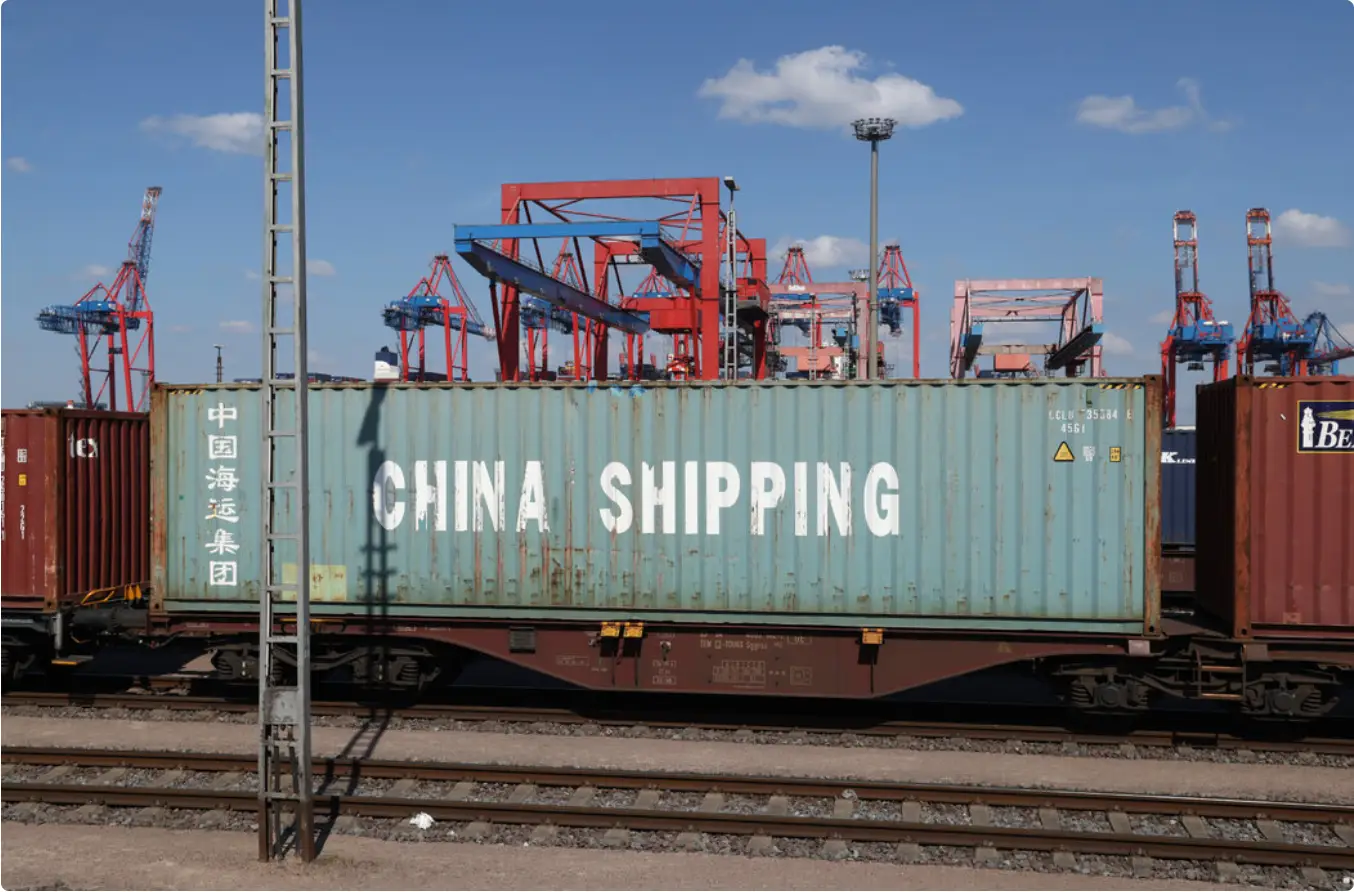
Containers on a flatbed train at the German port of Hamburg in April. The EU still exports a lot of products to China, especially Germany.
Things didn’t go as expected.
The EU instead finds itself in a geopolitical strait between the world’s two largest economies.
In Brussels, EU officials are trying to hammer out the rough outlines of a trade deal with the US before Trump imposes high, across-the-board tariffs that could devastate the European economy. Meanwhile, EU policymakers are trying to urge Beijing to stop supporting Russia, stop using huge amounts of state money to prop up its own industry and slow the flow of cheap goods into the bloc.
But at a time of dramatic change in the global trading system, the EU also needs to maintain a relatively stable relationship with China, the world's foremost manufacturing superpower.
EU leaders were due to travel to Beijing for a summit in late July, but plans have been in flux. Expectations for the meeting were low. While China has pushed the narrative that Trump's opposition to multilateral trade is pushing Europe into China's arms, European dissatisfaction with China's approach has only grown.
"Europe doesn't have a China card," said Liana Fix, a fellow for Europe at the Council on Foreign Relations.
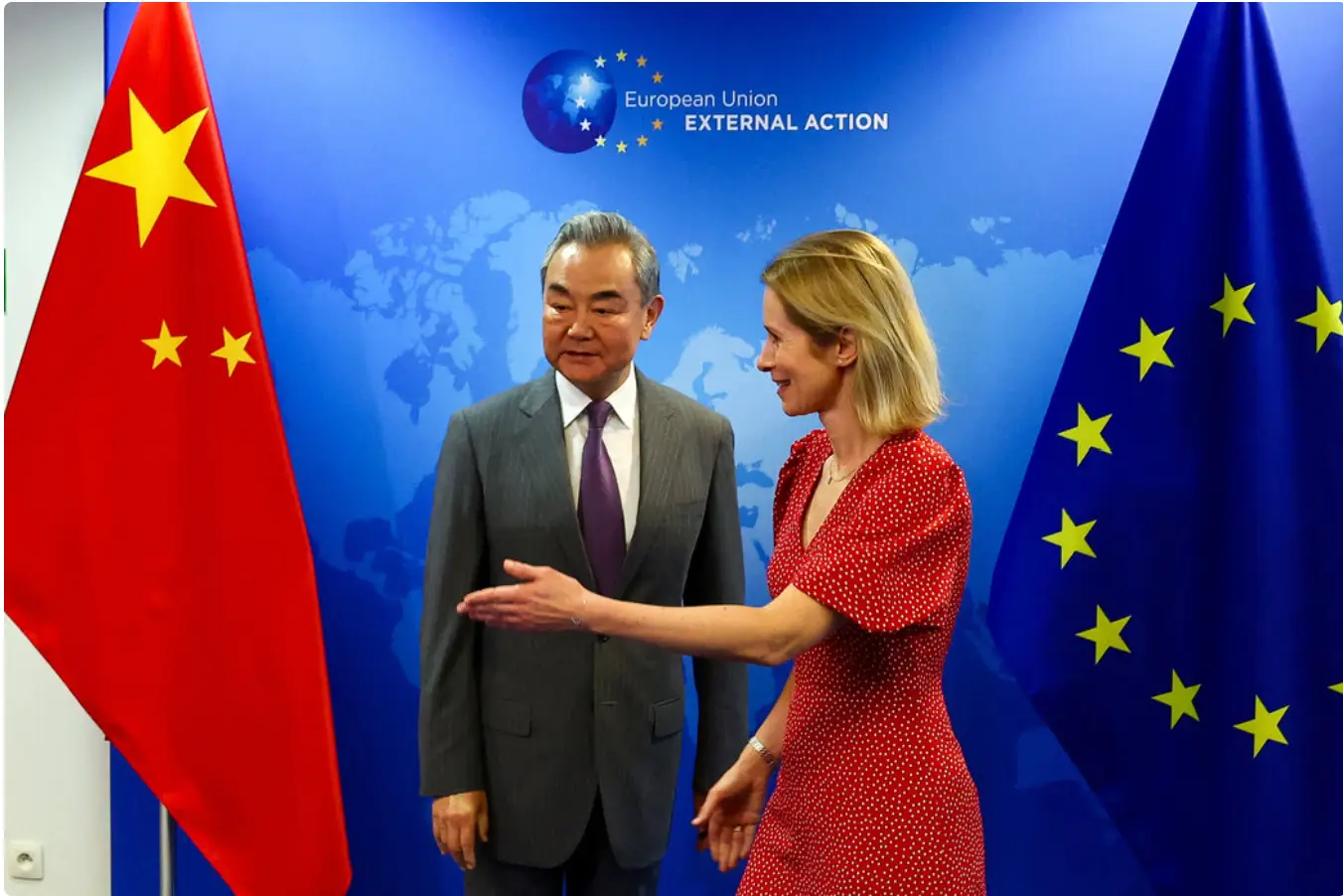
European Commission Vice President Kaya Kallas and Chinese Foreign Minister Wang Yi in Brussels
Tensions were on display as Chinese Foreign Minister Wang Yi met with EU leaders in Brussels in preparation for the summit. China called the meeting productive and denied there was a conflict between the two sides. EU officials, in turn, highlighted lingering pain points, including trade imbalances.
The divisions became more apparent this past weekend. The EU recently moved to restrict government purchases of Chinese medical devices, saying Chinese government agencies have been treating European companies unfairly and that it was necessary to create a level playing field. China announced on Sunday that it would take countermeasures.
But the EU remains in a delicate dynamic with China. The two economies are extensively linked. Many EU countries remain heavily dependent on China for industrial raw materials. EU exports to China remain substantial, especially from Germany, which has long had close trade ties with China.
Yet even as Chinese exports to the EU have surged, EU exports to China have been falling. As cheap products from fast-fashion retailers Shein and Temu flood the European market, policymakers have been working to tighten restrictions on such imports. EU leaders often complain that Chinese state banks subsidize their manufacturers so much that European companies can't compete.
Europe's complaints are not limited to trade. EU officials are angry about China's support for Russia in the war with Ukraine, which has provided Russia with a market for fuel and other products, undermining the effectiveness of EU sanctions.
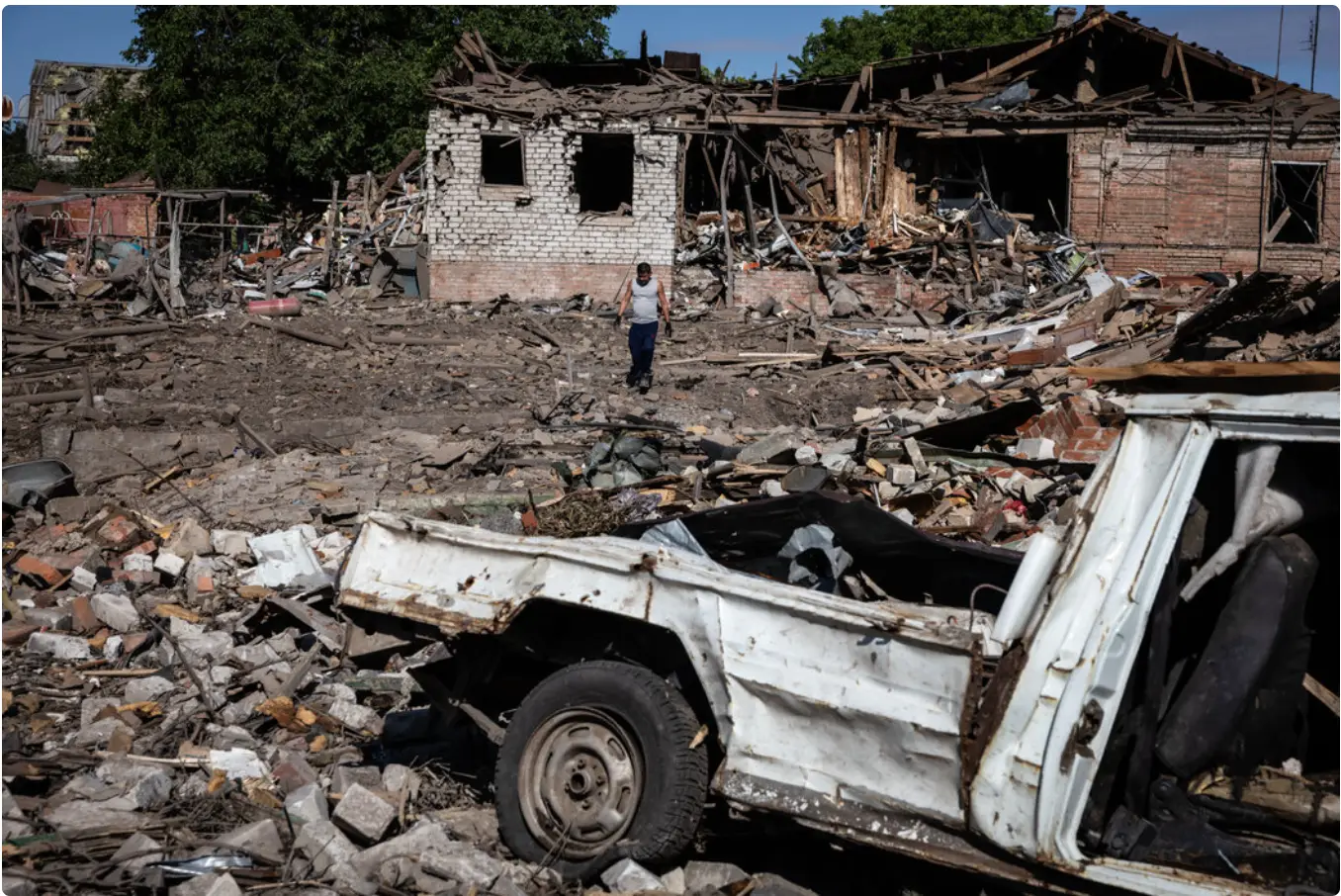
Russian missiles attacked Sloviansk, Ukraine, last month. EU officials are angry about China's support for Russia in the war with Ukraine.
The EU's goal cannot be to cut ties with China, said Lars Lökke Rasmussen, Denmark's foreign minister. "The goal is to engage on a more equal footing, to make our approach more transactional," he told a news conference on Friday.
The European Union has found itself isolated as the United States has upended the global trading system in an effort to narrow its trade deficit, boost government revenues and reshoring manufacturing. The 27-member bloc, the world's third-largest economy, was founded to facilitate cross-border trade and remains a staunch defender of free trade.
Europe wants to "show the world that it is possible to trade freely with many countries on a rules-based basis," European Commission President Ursula von der Leyen told a news conference last month.
The EU has already deepened trade ties with like-minded countries such as Switzerland and Canada. Von der Leyen hinted that the bloc could go further. The bloc could seek a new partnership with an 11-nation trade group that includes Japan, Vietnam and Australia but notably excludes the United States and China.
But as von der Leyen tries to go on the offensive, EU officials have spent months on the defensive.
At its root, the EU is questioning the policies of both the United States and China, but it is also caught between the two powers and caught between them.
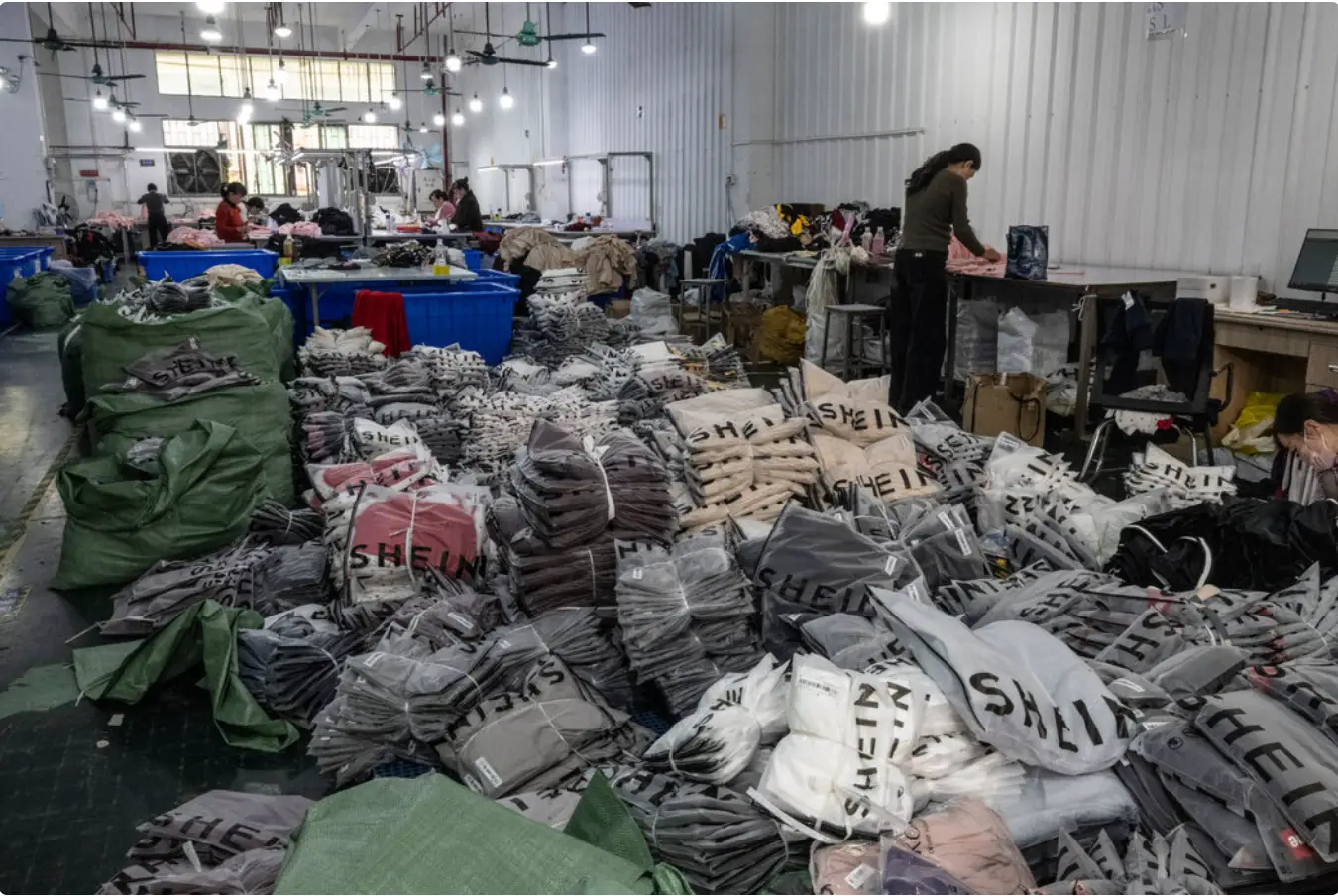
A package from the retailer Shein awaits shipment at a clothing factory in Guangzhou, China
Regardless of the outcome of trade negotiations between the EU and the Trump administration, EU tariffs on US exports will inevitably be higher than at the beginning of the year. US officials have repeatedly said that the 10% across-the-board tariffs currently imposed are not negotiable.
EU officials may also be forced to make concessions to reach a deal, including promising a tougher stance on China.
The EU agrees with Trump that China has been engaging in unfair trade practices. But given the close economic ties between the two sides, the EU's pressure is limited.
Recently, China once again made it feel this reality in a way that is unfavorable to the EU.
In response to US tariffs, China has restricted exports of rare earth magnets, which are essential for the production of a range of products, from cars and drones to factory robots and missiles.
Because China dominates rare earth production, it can use such restrictions to hit its trading partners hard.
European policymakers had initially hoped that China's restrictions would hit mainly U.S. companies. But European companies have also faced long delays in getting Chinese approval to buy rare earth products.
The delays are not just due to organizational problems China needs to solve in processing a large number of applications, but also appear to be related to a long-standing trade dispute between the European Union and China.
For years, the Chinese government has made technology transfer or sharing a condition for foreign companies to enter the Chinese market. More recently, European automakers and other companies have found themselves far behind Chinese competitors, who have led the development of electric vehicles, solar panels and other technologies.
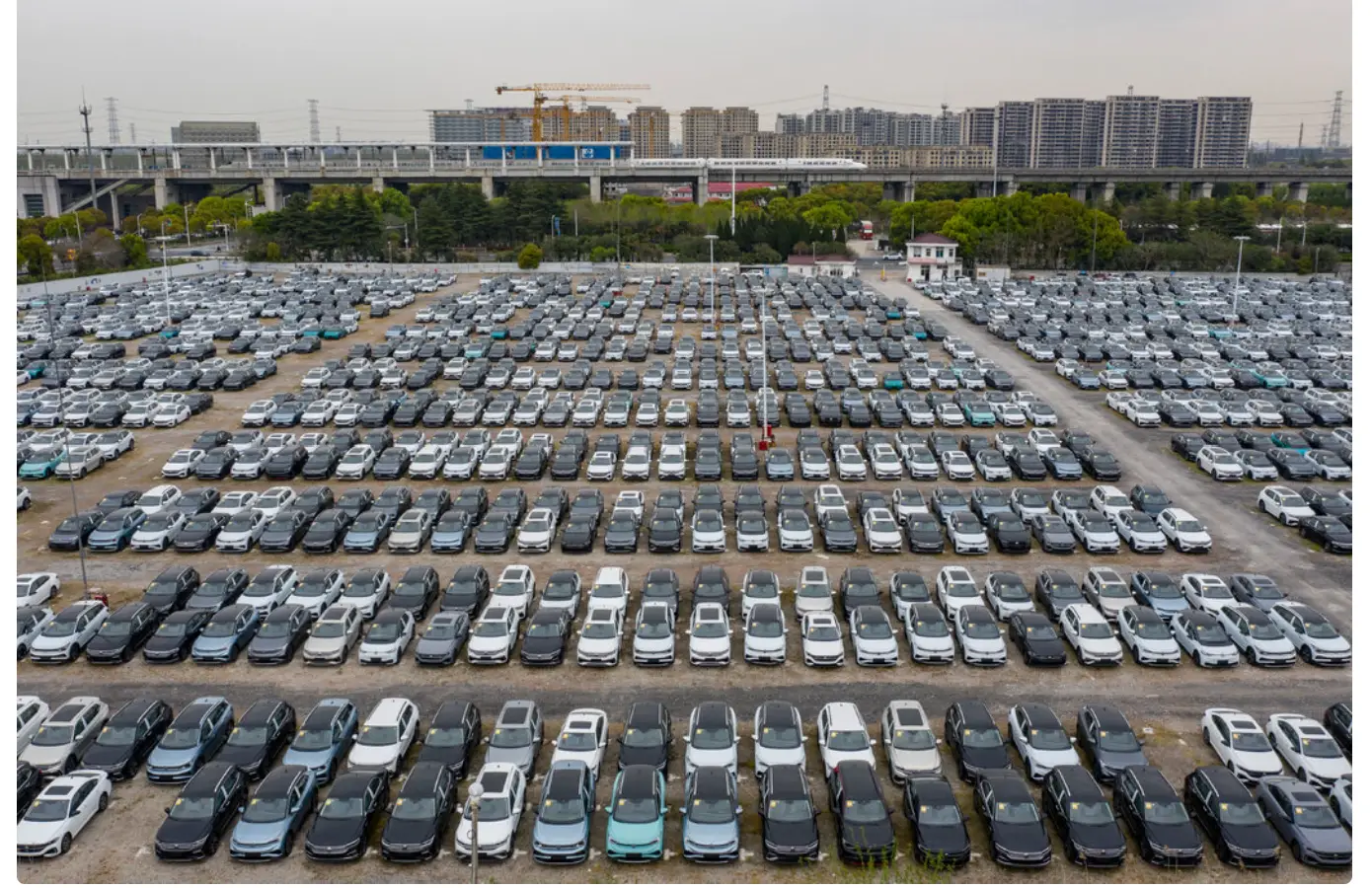
A car storage yard of a joint venture between Shanghai Automotive Industry Corporation and Volkswagen in Shanghai
As a result, European Union officials are demanding technology transfer from Chinese companies in exchange for access to the European market.
The European Union has also followed the United States in restricting exports of advanced process semiconductor equipment to China, which can be used for both military and civilian purposes.
The move has sparked strong dissatisfaction in China. Chinese Commerce Minister Wang Wentao asked the European Union to lift controls on exports of high-tech products to China as part of negotiations to resume supplies of rare earth products.
“Minister Wang Wentao proposed that the EU side should meet each other halfway and take effective measures to facilitate, safeguard and promote compliant trade in high-tech products to China,” China’s Ministry of Commerce wrote in a news release last month.
European officials are likely to continue to pressure Chinese officials to provide a more stable supply of rare earths at a summit in Beijing this month.
Jens Eskelund, president of the European Union Chamber of Commerce in China, said the chamber also hopes the meeting will focus on persuading Chinese officials to promote a more transparent and predictable regulatory system and address the growing difficulties for foreign companies doing business in China.
But the prospects for meaningful change or closer ties between Europe and China are not optimistic. The EU’s attitude is not positive.
Speaking at the Group of Seven summit in Canada last month, von der Leyen said China was adopting a cycle of “dominance-dependence-coercion.”

%20--%3e%3c!DOCTYPE%20svg%20PUBLIC%20'-//W3C//DTD%20SVG%201.1//EN'%20'http://www.w3.org/Graphics/SVG/1.1/DTD/svg11.dtd'%3e%3csvg%20version='1.1'%20id='图层_1'%20xmlns='http://www.w3.org/2000/svg'%20xmlns:xlink='http://www.w3.org/1999/xlink'%20x='0px'%20y='0px'%20width='256px'%20height='256px'%20viewBox='0%200%20256%20256'%20enable-background='new%200%200%20256%20256'%20xml:space='preserve'%3e%3cpath%20fill='%23FFFFFF'%20d='M194.597,24.009h35.292l-77.094,88.082l90.697,119.881h-71.021l-55.607-72.668L53.229,232.01H17.92%20l82.469-94.227L13.349,24.009h72.813l50.286,66.45l58.148-66.469V24.009z%20M182.217,210.889h19.566L75.538,44.014H54.583%20L182.217,210.889z'/%3e%3c/svg%3e)